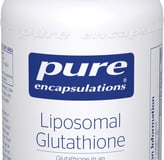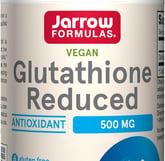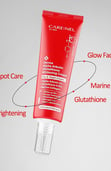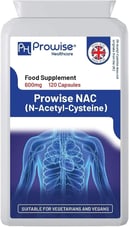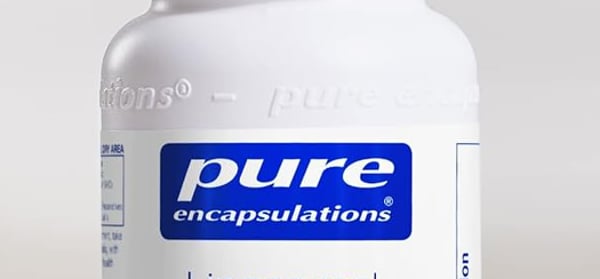The Power of Glutathione in the Treatment of Eczema & Psoriasis
HEALTH
The Role of Antioxidants in Skin Health: How Glutathione Helps
Antioxidants play a crucial role in maintaining skin health by neutralizing free radicals, which are unstable molecules that can cause oxidative stress and damage to skin cells. Oxidative stress is a significant factor in the development and exacerbation of various skin conditions, including eczema and psoriasis. Among the myriad of antioxidants available, glutathione stands out due to its potent protective properties and its essential role in cellular defense mechanisms.
Glutathione, often referred to as the "master antioxidant," is a tripeptide composed of three amino acids: cysteine, glutamine, and glycine. Its unique structure allows it to efficiently neutralize free radicals and reactive oxygen species, thereby reducing oxidative stress. By mitigating oxidative damage, glutathione helps maintain the integrity of skin cells, promoting healthier skin and reducing the severity of inflammatory skin conditions.
Inflammation is a common underlying factor in both eczema and psoriasis, leading to symptoms such as redness, itching, and discomfort. Glutathione exerts anti-inflammatory effects by modulating the immune response and inhibiting the production of pro-inflammatory cytokines. This dual action of antioxidant protection and inflammation reduction makes glutathione a valuable asset in managing and potentially alleviating symptoms associated with these chronic skin conditions.
Beyond its therapeutic benefits for eczema and psoriasis, glutathione also contributes to overall skin health and appearance. It supports the detoxification processes in the liver, which in turn, can lead to clearer and more radiant skin. Additionally, glutathione has been shown to inhibit melanin production, potentially aiding in the reduction of hyperpigmentation and promoting a more even skin tone.
Incorporating antioxidants like glutathione into a skincare regimen or treatment plan can provide significant benefits. By protecting skin cells from oxidative damage and inflammation, glutathione not only helps manage chronic skin conditions but also enhances the overall health and appearance of the skin.
Glutathione: The Master Antioxidant and Its Benefits for Psoriasis Sufferers
Glutathione, often hailed as the 'master antioxidant,' plays a pivotal role in maintaining cellular health and combating oxidative stress. This tripeptide, comprising glutamine, cysteine, and glycine, is crucial for detoxifying the body and neutralizing free radicals. For individuals suffering from psoriasis, the benefits of glutathione extend beyond its general antioxidant properties. It acts through specific mechanisms that help alleviate the symptoms of this chronic skin condition.
One of the primary ways glutathione benefits psoriasis sufferers is by reducing inflammation. Psoriasis is characterized by an overactive immune response that leads to excessive skin cell production and inflammation. Glutathione helps to modulate the immune system, reducing the inflammatory cytokines responsible for the rapid skin cell turnover. By balancing the immune response, glutathione can significantly diminish the redness, scaling, and itching associated with psoriasis flare-ups.
Furthermore, glutathione promotes skin healing and regeneration. Its ability to enhance cellular repair processes is particularly beneficial for psoriatic lesions, which often leave the skin damaged and susceptible to further irritation. Glutathione aids in the synthesis of proteins and DNA, essential components for skin repair and regeneration. This accelerated healing process can lead to a noticeable improvement in the appearance and texture of the affected skin.
Recent studies have underscored the efficacy of glutathione in treating psoriasis. Clinical trials have shown that patients receiving glutathione supplementation exhibited a marked reduction in the severity and frequency of their symptoms. These findings suggest that glutathione not only provides symptomatic relief but may also play a role in addressing the underlying causes of psoriasis.
Incorporating glutathione into a comprehensive treatment plan offers a promising avenue for managing psoriasis. Its multi-faceted approach—combining antioxidant protection, immune modulation, and skin healing—makes it a valuable asset in the ongoing battle against this debilitating skin condition.
How to Incorporate Glutathione into Your Psoriasis Treatment Plan
Incorporating glutathione into your psoriasis treatment plan can be a multifaceted approach, involving various forms of supplementation to optimize its benefits. Understanding the different methods of administration and their corresponding dosages is crucial for effective integration.
Firstly, oral supplements are a common and convenient method of increasing glutathione levels. These supplements typically come in the form of liquid, capsules or tablets. It's essential to follow the recommended dosage as indicated on the product label or as prescribed by your healthcare provider. Standard dosages generally range from 500 mg to 1,000 mg per day. Some individuals might prefer liposomal glutathione, which is believed to have better absorption rates compared to regular glutathione supplements.
Topical applications of glutathione are also gaining popularity in the treatment of psoriasis. These come in the form of creams, lotions, or gels that are applied directly to the affected areas. Topical products can be particularly beneficial for targeting specific lesions and reducing inflammation and irritation. It is advisable to use these products as directed, usually once or twice daily.
While glutathione is generally considered safe, it's essential to be aware of potential side effects. Oral supplements may cause discomfort, such as bloating or nausea. Topical applications could cause mild skin irritation for some users.
To ensure safety and efficacy, it is paramount to consult with a healthcare provider before incorporating glutathione into your psoriasis treatment plan. They can provide personalized advice, adjust dosages accordingly, and monitor for any adverse reactions, ensuring a holistic and effective approach to managing psoriasis.
Top Foods to Boost Your Body's Glutathione Levels Naturally
Boosting your body's glutathione levels naturally can be achieved through a well-balanced diet rich in specific foods known for their glutathione-enhancing properties. Incorporating a variety of fruits, vegetables, nuts, and proteins can significantly contribute to the production of glutathione, which plays a crucial role in maintaining skin health, especially for those suffering from eczema and psoriasis.
Firstly, sulfur-rich vegetables such as broccoli, Brussels sprouts, cauliflower, and kale are excellent choices. These cruciferous vegetables contain high levels of sulfur, a key component needed for glutathione synthesis. Including them in your diet can be as simple as adding them to salads, stir-fries, or steaming them as a side dish.
Certain fruits, notably avocados, are also beneficial. Avocados are not only rich in healthy fats but also contain high levels of glutathione. Enjoy them sliced in salads, blended into smoothies, or simply as a spread on whole-grain toast.
Nuts and seeds, particularly walnuts and sunflower seeds, offer another route to enhance glutathione levels. These foods are packed with selenium, a mineral that supports the activity of glutathione peroxidase, an enzyme involved in the glutathione cycle. Snacking on a handful of nuts or adding seeds to your yogurt or oatmeal can be an easy way to boost your intake.
Proteins, especially those from lean meats, fish, and legumes, are crucial as they provide cysteine, an amino acid vital for glutathione production. Incorporate sources like chicken breasts, salmon, lentils, and chickpeas into your meals. These proteins can be baked, grilled, or added to soups and stews to create nutrient-dense dishes.
In addition to these specific foods, maintaining a diet rich in a variety of fruits and vegetables will ensure a broad intake of antioxidants and other nutrients that support overall skin health. Regularly consuming these glutathione-enhancing foods can help manage and alleviate symptoms of eczema and psoriasis, promoting healthier skin from within.
The Science Behind Glutathione and Its Impact on Psoriasis
Glutathione, often referred to as the "master antioxidant," plays a crucial role in mitigating oxidative stress and inflammation, both of which are pivotal in the pathophysiology of psoriasis. Psoriasis is a chronic inflammatory skin condition characterized by the rapid proliferation of keratinocytes, leading to thick, scaly plaques. The underlying mechanisms involve an overactive immune response that produces excessive amounts of reactive oxygen species (ROS), causing significant oxidative damage to skin cells.
Scientific research has demonstrated that glutathione combats oxidative stress by neutralizing ROS, thereby reducing cellular damage. This antioxidant capability is vital in the context of psoriasis, where reducing oxidative stress can significantly alleviate the inflammatory response. Glutathione exists in two forms in the body: reduced (GSH) and oxidized (GSSG). The ratio of GSH to GSSG is a key indicator of cellular oxidative stress, with higher levels of GSH being indicative of better antioxidant defense.
Several studies have explored the therapeutic potential of glutathione in psoriasis treatment. One notable study published in the Journal of Dermatological Science* revealed that patients with psoriasis had significantly lower levels of GSH in their skin compared to healthy individuals. Supplementation with glutathione resulted in a marked improvement in skin lesions, demonstrating its efficacy in restoring the antioxidant balance.
Further clinical trialshave reinforced these findings. A randomized controlled trial conducted in 2020 assessed the impact of oral glutathione supplementation in psoriasis patients. The study found that participants who received glutathione showed a significant reduction in the Psoriasis Area Severity Index (PASI) scores compared to the placebo group. This indicates that glutathione not only reduces oxidative stress but also directly mitigates the clinical symptoms of psoriasis.
The body of evidence underscores the importance of glutathione in psoriasis management. By addressing both oxidative stress and inflammation, glutathione emerges as a promising adjunctive treatment, offering a scientifically-backed approach to improving patient outcomes in psoriasis care.
Stress Management and Psoriasis: How Glutathione Can Help
Psoriasis is a chronic skin condition marked by inflamed, scaly patches, and stress is a well-known trigger for exacerbating its symptoms. The connection between stress and psoriasis flare-ups is well-documented, with studies indicating that increased stress levels can provoke the body's inflammatory response, thereby worsening the condition. One of the crucial factors in this relationship is oxidative stress, caused by an imbalance between free radicals and antioxidants in the body.
Oxidative stress plays a significant role in the pathogenesis of psoriasis, leading to increased inflammation and skin cell turnover. This is where glutathione, a potent antioxidant, becomes highly relevant. Glutathione's primary function is to neutralize free radicals, thus reducing oxidative stress. Its antioxidant properties help in maintaining the skin's integrity by minimizing cellular damage and inflammation, which are critical in managing psoriasis symptoms.
Incorporating glutathione into a psoriasis treatment regimen can be beneficial in several ways. Firstly, glutathione supplements can help replenish the body's antioxidant levels, offsetting the damage caused by oxidative stress. Secondly, by mitigating oxidative stress, glutathione can indirectly influence the stress response, as lower oxidative stress levels are associated with reduced inflammation and a better overall physiological state.
Beyond supplementation, practical lifestyle changes can further enhance stress management and, consequently, psoriasis control. Engaging in regular physical activity, practicing mindfulness and meditation, ensuring adequate sleep, and adopting a balanced diet rich in antioxidants can collectively contribute to lowering stress levels. Foods high in glutathione precursors—such as sulfur-rich vegetables like broccoli, garlic, and onions—can also support the body's natural glutathione production.
Mindfulness practices, such as yoga and deep-breathing exercises, are particularly effective in managing daily stress. These activities not only promote relaxation but also enhance the body's ability to cope with stress, thereby reducing the frequency and severity of psoriasis flare-ups. By integrating these strategies with glutathione supplementation, individuals with psoriasis can achieve a more holistic approach to managing their condition, ultimately leading to improved skin health and overall well-being.
NAC (N-Acetyl-Cysteine) for Boosting Glutathione Levels in Psoriasis Management
N-Acetyl-Cysteine (NAC) is a powerful supplement known for its ability to boost glutathione levels in the body. This amino acid derivative plays a crucial role in the synthesis of glutathione, the body's master antioxidant, which can be particularly beneficial for individuals managing psoriasis. Here's why incorporating NAC into your routine could be a game-changer for your skin health:
How NAC Works
1. Precursor to Glutathione: NAC is a precursor to cysteine, which is a key component in the production of glutathione. By increasing cysteine levels, NAC directly boosts the synthesis of glutathione in the body.
2. Antioxidant Properties: Like glutathione, NAC has potent antioxidant properties that help neutralize harmful free radicals and reduce oxidative stress, which is often elevated in psoriasis.
3. Detoxification Support: NAC supports liver function and enhances the body's natural detoxification processes. Efficient detoxification can reduce systemic inflammation, benefiting those with psoriasis.
4. Immune System Regulation: NAC helps modulate the immune system, potentially reducing the overactive immune response that characterizes autoimmune conditions like psoriasis.
Benefits of NAC for Psoriasis
1. Reduction of Inflammation: By boosting glutathione levels, NAC can help reduce the chronic inflammation associated with psoriasis, leading to fewer flare-ups and less severe symptoms.
2. Enhanced Skin Health: With its antioxidant capabilities, NAC supports overall skin health, promoting healing and reducing oxidative damage to skin cells.
3. Improved Detoxification: NAC aids in the elimination of toxins and harmful substances from the body, which can contribute to reduced inflammation and better management of psoriasis.
How to Incorporate NAC into Your Routine
1. Dietary Sources: While NAC supplements are the most direct way to boost levels, you can also support your body's production of cysteine through dietary sources such as poultry, eggs, garlic, onions, and broccoli.
2. NAC Supplements: Available in various forms, including capsules, powders, and tablets, NAC supplements are a convenient way to ensure you're getting an adequate amount. Always choose high-quality, reputable brands for the best results.
3. Dosage Recommendations: It's essential to follow the recommended dosage instructions on the supplement packaging or consult with a healthcare provider for personalized advice. Typical dosages for NAC range from 600 to 1800 mg per day.
Quality NAC Supplements on Amazon
If you're ready to boost your glutathione levels and enhance your psoriasis management, here are some top-rated NAC supplements available on Amazon:
Incorporating NAC into your daily routine can significantly enhance your body's glutathione production, offering a natural and effective way to manage psoriasis. By reducing inflammation, supporting detoxification, and promoting overall skin health, NAC can be a valuable addition to your treatment plan. Explore the range of NAC supplements on Amazon today and take a step towards healthier, clearer skin.
Conclusion: Embrace the Healing Power of Glutathione for Psoriasis Relief
In conclusion, glutathione stands out as a promising ally in the fight against psoriasis. Its powerful antioxidant properties, ability to modulate the immune system, and support for detoxification processes make it a valuable addition to any psoriasis treatment plan. By incorporating glutathione, whether through diet, supplements, or topical applications, individuals with psoriasis may experience significant improvements in their symptoms and overall skin health.
For those ready to explore the benefits of glutathione, quality products are readily available on Amazon. From capsules to topical creams, these supplements can be easily integrated into your daily routine. Here are some top-rated glutathione products available on Amazon:
Pure Encapsulations Liposomal Glutathione Fast Acting – A highly reviewed supplement known for its purity and effectiveness.
Jarrow Formulas Glutathione Reduced – Another excellent choice, praised for its bioavailability and quality.
Alpha Arbutin Glutathione Whitening Cream – A topical option for those who prefer direct application to affected areas.
Taking the step to include glutathione in your psoriasis management regimen could be transformative. Whether you're looking for relief from flare-ups, aiming to improve your skin health, or seeking a comprehensive approach to manage your condition, glutathione offers a natural, scientifically-backed solution. Start your journey towards better skin health today by exploring the variety of glutathione products on Amazon and finding the one that best fits your needs.
References
Journal of Dermatological Science*

